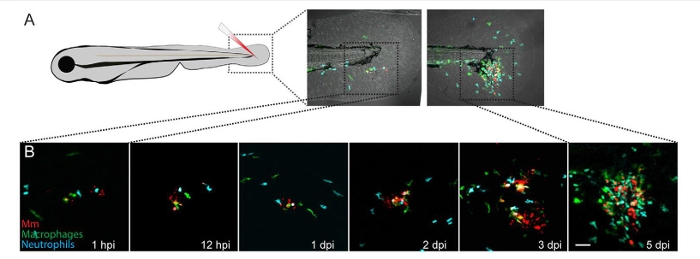Research project
Glucocorticoid modulation of the immune response
Unraveling the immune-suppressive actions of drugs like prednisone.
- Duration
- 2016 - 2020
- Contact
- Marcel Schaaf
- Funding
-
 CSC fellowship
CSC fellowship
- Partners

Because of their immune-suppressive effects, glucocorticoids are widely used as drugs to treat various immune-related diseases like asthma, rheumatoid arthritis, common eczema, leukemia and several auto-immune diseases. They belong to the most prescribed drugs in the world, but two issues limit the clinical use of glucocorticoids: the severity of the side effects and the occurrence of resistance to this therapy. In order to develop novel glucocorticoid therapies that are not hampered by these issues, more insight is required into the molecular and cellular mechanisms of glucocorticoid modulation of the immune response. Recently, the groups of Dr. Schaaf and Dr. Meijer have shown that glucocorticoids elicit immune-suppressive effects in zebrafish, which has established the zebrafish as an interesting model system to unravel the modulation of the immune system by glucocorticoids in detail.
In the first part of the project, glucocorticoid modulation of the immune response to wounding will be investigated. In 3 day old zebrafish larvae, a part of the tail fin will be amputated. This causes a local inflammatory response in the tail fin. Leukocytes from the innate immune system (neutrophils and macrophages) migrate towards to the site of injury [12]. Interestingly, the migration of neutrophils is attenuated upon glucocorticoid administration, but the migration of macrophages is resistant to this treatment. Through specific transcriptome analysis of the neutrophil and macrophage populations the different transcriptional responses of these immune cell types to wounding and the modulation of this response by glucocorticoids will be studied. In addition, the role of the endogenous glucocorticoid cortisol will be studied as well. The concentration of cortisol at different time points after wounding will be determined using ELISA. It is hypothesized that increased cortisol levels are an important feedback mechanism in the immune response, important for the resolution of inflammation.
In the second part of the project, glucocorticoid modulation of the immune response to a bacterial infection will be investigated. An infection model will be used in which zebrafish larvae are infected with Mycobacterium marinum [14-19]. This infection highly resembles the infection with Mycobacterium tuberculosis in humans, which causes tuberculosis. First, the effect of glucocorticoid treatment on the bacterial burden will be investigated at different time points after infection. The molecular mechanism behind the glucocorticoid modulation will be studied, and techniques used will be similar to those used in the studies on the wounding model. Since chronic stress increases the risk of attracting tuberculosis, and cortisol is suggested to play an important role in this process, the role of endogenous cortisol will be investigated as well.

